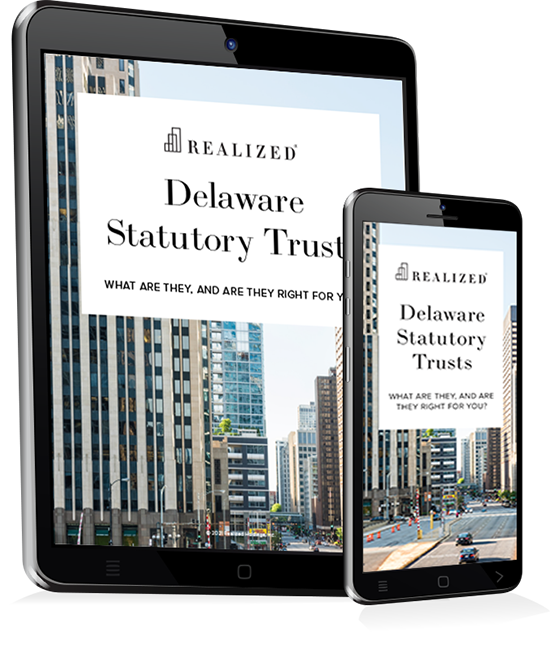



See if Delaware Statutory Trusts are right for you.
By providing your email and phone number, you are opting to receive communications from Realized. If you receive a text message and choose to stop receiving further messages, reply STOP to immediately unsubscribe. Msg & Data rates may apply. To manage receiving emails from Realized visit the Manage Preferences link in any email received.
Delaware Statutory Trusts (DSTs) are unique investment vehicles designed for real estate investors. With a DST, multiple investors each hold a fractional stake in the trust's property holdings, which are identified, acquired, and managed by a professional real estate firm known as the DST Sponsor. This innovative ownership structure allows investors to gain exposure to real estate assets without the burden of direct property ownership.
With traditional real estate investments, investors often enjoy a wide range of potential benefits, including long-term asset and capital appreciation, numerous tax-advantaged strategies, and increased portfolio diversification. However, selling highly appreciated real property assets also can also bring some serious tax considerations. Real estate investors with long-term investment horizons often complete 1031 Exchanges to defer capital gains and depreciation recapture taxes, but finding suitable replacement properties – especially in competitive real estate markets – can be challenging. Rolling 1031 Exchange sale proceeds over into a Delaware Statutory Trust can alleviate some of the problems that can occur during the 1031 Exchange process, primarily timing and finding assets with correlating values.
Failing to formally identify and close on a 1031 Exchange property in the allotted time frames could leave you with a considerable tax burden – long-term capital gains taxes could erode the wealth you have accumulated over time. However, you don’t need to find another direct property to fulfill your 1031 Exchange requirements. Since Delaware Statutory Trusts are prepackaged investment vehicles, completing a DST 1031 Exchange can help investors complete their exchanges on time and in the exact amounts necessary to satisfy exchange requirements.
Let’s take a look at how investors are using DST 1031 Exchanges to help manage the tax liabilities that come with selling appreciated investment real estate.

Delaware Statutory Trusts are real estate investment vehicles that provide individual investors with access to commercial investment properties that may be significantly larger than what they could acquire on their own. These properties are often the same type and quality as those owned by large institutional investors such as pension funds, insurance companies, or real estate investment trusts (REITs).
Delaware Statutory Trusts are formed and managed by professional real estate companies who act as the trust’s Sponsor. These companies leverage their expertise, experience, and capital to select and acquire commercial real estate properties to be placed under trust. DST Sponsors may focus on one or more sectors of the commercial real estate industry, such as senior or student housing, multifamily apartment complexes, hospitality, office or industrial warehouse, and distribution facilities.
These real property assets typically have valuations in the tens of millions of dollars, placing them well beyond the financial reach of most investors. Once a property or portfolio of properties is fully assembled and placed under trust, the Sponsor opens up an offering period to accredited investors, who purchase fractional shares in the DST until all of the available equity in the offering has been placed.
DST investors receive monthly or quarterly distributions from the trust, when applicable, according to their pro rata share of the trust. Investing in DSTs also can help investors move from active to passive ownership – you no longer own real property but rather shares of a trust that is the legal owner of all properties held within it. This separation provides an important legal buffer between DST investors and the trust.

Here are six reasons why a DST 1031 Exchange can be an appealing option for real estate investors.
All properties held under trust are extensively vetted by the DST Sponsor. All the important due diligence, financial modeling and forecasting, appraisals, inspections, and environmental reports must be completed prior to the initial offering period.
The DST Sponsor also has typically obtained financing (if needed) during the deal, as well as hired third-party management to oversee the day-to-day operation of the assets held in trust.
Sponsors take care of all the financial, taxation, and other important documentation for the properties held under trust, as well as for the trust itself.
DSTs provide 1031 Exchange-eligibility both upfront and upon exit1, which allows increased flexibility with your 1031 Exchange options.
Commercial Real Estate investors who need to complete 1031 Exchanges can buy fractional shares of a DST in the exact amounts needed to satisfy their exchange requirements. This option can alleviate the need for investors to find like-kind replacement properties that align with the value of their relinquished assets.
Timing is a crucial aspect of successfully completing a 1031 Exchange. Investors have 45 days to formally identify replacement properties and 180 days to close on them. If you miss either deadline, your exchange will likely be disqualified by the IRS. Exchanging into a prepackaged DST may help investors reduce execution risk by alleviating the deadline pressure associated with standard 1031 Exchanges.
1. Except for UPREIT transactions
We highlighted how DST 1031 exchanges can help CRE investors complete their exchanges. Here are some additional Delaware Statutory Trust pros for CRE investors to consider.
DST Sponsors leverage their expertise in commercial real estate to acquire high-value assets that most solo investors couldn’t afford on their own. By pooling your investment capital with others, you can include assets such as hotels, assisted living facilities, industrial distribution and fulfillment centers, self-storage facilities, or triple-net leased retail buildings in your real estate portfolio.
Minimum investments for DSTs are typically $100,000, which can allow you to spread out your exchange capital into multiple DSTs to help manage investment risk. The minimum cash investments in DSTs can be as low as $25,000.
CRE investors who want to shed the many responsibilities that are associated with direct property ownership can wash their hands completely of management duties by exchanging into passive DST investments.
By investing into multiple Delaware Statutory Trusts, you can enjoy increased portfolio diversification through different geographical locations, property types, and asset classes.
DSTs are considered illiquid investments with lengthy hold times, so they are only available to accredited investors. Accredited investors have an annual income exceeding $200,000 ($300,000 for married couples) in each of the prior two years and reasonably expect the same for the current year, or have a net worth of at least $1 million, excluding their primary residences. There are also certain professional criteria that may qualify individuals as accredited investors. Entities may also qualify as accredited investors if they meet certain criteria.
Delaware Statutory Trusts are illiquid investments, which is why they are only available to accredited investors. Circumstances often change, though, and investors may unexpectedly need early access to their DST investment capital.
It may be possible to divest all or some of your DST position prior to reaching the full holding period via a secondary marketplace. Investors can receive an opinion of market value for their DST interests using data based on recent market transactions. A third party can help connect you with a buyer or represent the seller in a secondary market transaction, as well as help you complete all the necessary paperwork, gain required approvals, and arrange a closing using a secure, 1031 Exchange-qualified escrow account.

Real estate investors use 1031 Exchanges to defer capital gains and depreciation recapture taxes on the sale of appreciated investment real estate. In a straight sale, property owners face capital gains taxes on sale proceeds for any amount above their adjusted tax basis. Long-term capital gains taxes are either 0, 15, or 20 percent depending on your income and tax filing status. Depreciation recapture taxes are 25 percent.
However, by rolling sale proceeds over into a like-kind replacement property through a 1031 Exchange, you can defer your capital gains tax liabilities. Theoretically, you can defer capital gains taxes indefinitely – and grow your investment capital over time – through subsequent exchanges. When you die, you can bequeath your real estate assets to your heirs, who receive a one-time step-up in basis that may erase any accumulated capital gains taxes. However, if down the road you sell an exchange property in a straight sale, you’ll have to pay any accumulated capital gains and depreciation recapture from the time of step-up.
As noted earlier, Delaware Statutory Trusts provide 1031 Exchange eligibility upfront and upon exit. You can exchange out of a highly appreciated office building that’s been held by the family for decades into a DST, back into a standalone retail building, and back again into a DST, all the while deferring capital gains tax liability generated from the sale of the original office property.

Like any investment, 1031 Exchanges aren’t without risks. DST risk factors can include illiquidity, macroeconomic factors such as rising interest rates, and changes in the regulatory environment. Let’s take a closer look at some of the risk factors that may impact DST investments.
Interest rates can have an outsized role in determining how investment properties perform. The higher cost of mortgage debt can lead to downward pressure on returns. Similarly, recessionary periods can negatively affect occupancy rates and the ability to find willing buyers if the DST Sponsor wants to divest trust assets.
DSTs are subject to many regulatory constraints from the IRS. Completing a 1031 Exchange takes a great deal of advance planning to ensure the exchange remains compliant with IRS guidelines. Tax laws and regulations also are routinely debated and amended by Congress.
Certain property types are subject to additional risks and economic pressures.
A full rundown of potential risk factors can be found in the Private Placement Memorandum of the DST, which is provided by the Sponsor.
1. San Francisco Office Figures, Q2 2023, CBRE, https://mktgdocs.cbre.com/2299/c92d8e79-50bb-4d26-a569-3cd86ff96d9d-131008546.pdf

While DST investments can have many positive attributes, they may not be a good fit for all investors. A few Delaware Statutory Trust cons may include:
Once a DST offering closes, the trust cannot take in any additional financial contributions from investors. Major expenditures, such as replacing a roof or resurfacing a parking lot, can consume several year’s profits. Similarly, changes in occupancy or reduction in rent rolls can erode a property’s cash flow.
DST’s are 100-percent passive investments. The DST Sponsor makes all decisions on your behalf. You won’t have a say in how properties under trust are managed or if they are sold.
DSTs have holding periods typically ranging from five to 10 years. It may not be possible to exit your DST investment prior to its targeted timeline.

DSTs typically assess fees at three levels: upfront, operating, and disposition. Legal, loan, and lender expenses are common in real estate acquisitions, but many upfront costs in Delaware Statutory Trusts aren’t as typical. These upfront fees can include (but are not limited to):
Most DST investment sales are conducted through third-party selling groups. These groups include registered representatives and registered investment advisors (RIAs). Commissions are built into the offering to compensate these groups for raising equity for the DST.
Since DSTs are recognized as securities, DST offerings are often marketed through entities known as “managing broker-dealers.” When broker-dealers are involved, they typically assist in due diligence, document preparation, sales, and securities compliance.
Sponsors utilize selling teams, known as wholesalers, who work with registered representatives and RIAs to ensure they obtain all information and documents needed to effectively sell an offering. These individuals are typically responsible for a geographical area and can receive a commission for sales or the raising of capital that occurs within their region.
These include any overhead costs associated with establishing and running the Delaware Statutory Trust, including marketing materials, securities registration, and other miscellaneous costs.
Sometimes referred to as a “finder’s fee,” acquisition fees are payments to the Sponsor for identifying, negotiating, and acquiring the asset in the DST. Sponsors may also take an additional fee for obtaining financing for the acquisition.
Capital for fees and reserve accounts above the purchase price of the underlying asset are commonly referred to as the “load.” It’s important to consider these fees when thinking about returning 100 percent of your capital when it comes time to sell — the greater the load, the higher the underlying property in the Delaware Statutory Trust must be sold for in order to return investors’ original equity. There can be other fees over the lifespan of the DST as well, including sponsor asset management fees and disposition fees upon the sale of the property.
Delaware Statutory Trusts are rigidly structured — trustees cannot enter into new lease agreements with tenants or renegotiate existing leases since the Sponsor makes all decisions on behalf of the statutory trust. However, when the Delaware Statutory Trust is formed, the trust can enter into a master lease agreement wherein the whole property is leased to a master tenant.
 The master tenant assumes all operating responsibilities for the property. This agreement allows the master tenant to sublease space to tenants, as well as enter into property management contracts or sub-management deals. The master tenant makes lease payments to the Delaware Statutory Trust that usually equal the required debt service and a return to beneficiaries. Master leases typically are long term with multiple options for extensions.
The master tenant assumes all operating responsibilities for the property. This agreement allows the master tenant to sublease space to tenants, as well as enter into property management contracts or sub-management deals. The master tenant makes lease payments to the Delaware Statutory Trust that usually equal the required debt service and a return to beneficiaries. Master leases typically are long term with multiple options for extensions.
Master lease agreements allow for additional leasing and management activity that can potentially benefit the performance of the property while ensuring trustees remain compliant with IRS regulations.
DSTs are commonly viewed as illiquid assets due to their long investment horizons. However, investors may potentially exit their 1031 DST Exchanges under one of the following scenarios:
 This is the most common exit strategy. In this scenario, the Sponsor sells the property or properties to another party. Investors receive their pro rata share of the net sales proceeds and can either complete another 1031 exchange or pay any associated taxes.
This is the most common exit strategy. In this scenario, the Sponsor sells the property or properties to another party. Investors receive their pro rata share of the net sales proceeds and can either complete another 1031 exchange or pay any associated taxes.
The 721 UPREIT option can be a useful tool for investors in the right situation. After a holding period of typically two years, if a Sponsor decides to exercise the UPREIT option, investors may exchange their DST interests for Operating Partnership units (OP Units) of an Operating Partnership of a REIT, which is known as an UPREIT transaction under Section 721 of the Tax Code. Investors can either hold these OP Units and collect distributions from the Operating Partnership, or convert them for shares in the REIT, which may be liquidated subject to the REIT's requirements. In certain DSTs, the investor will have full discretion over whether DST interests are exchanged for OP units via an UPREIT transaction or cash that may be used towards a subsequent 1031 exchange.
We’ve covered many scenarios associated with Delaware Statutory Trusts, but there are some special considerations upon which we haven’t yet discussed. These include:
Dissolution of a marriage that involves commercial real estate assets can leave both spouses with significant capital gains liabilities if they decide to sell. However, exchanging those assets into a Delaware Statutory Trust can potentially provide both parties with residual monthly income without paying capital gains tax. When the DST is dissolved, both parties can independently cash out or roll their proceeds over into another tax-deferred 1031 Exchange.
Although multifamily properties have long been the preferred asset class for DSTs, Sponsor offerings also can include student housing, hospitality, self-storage, medical/commercial office, industrial warehouse/fulfillment, or single-tenant retail. Two new DST structures are changing the investment landscape as well. The first is cash-out transactions, wherein investors assume a property’s debt financing after closing in order to access its equity. The second is a zero cash flow structure, which is based on the strength of a net-lease tenant’s credit rating. All income generated from the property is used to service its debt. The benefit of a zero cash flow offering is its ability to gain high leverage with minimum equity. While these investments may generate low income or even show a loss, investors can use that loss to offset gains elsewhere. This structure also allows investors to potentially increase their depreciable basis in a 1031 Exchange.
Exchanging into tax-deferred DST replacement properties can be broken down into three steps:

Many passive real estate investment options exist nowadays, providing investors with a wide range of choices based on their needs and investment goals. Two popular avenues are Delaware Statutory Trusts (DSTs) and non-traded real estate ...

For many investors, building a passive real estate portfolio is an end goal. It’s how you keep earning income after retirement while also securing your wealth for future generations. There are many types of real estate assets that can ...

Delaware Statutory Trusts (DSTs) carry a lot of promise, especially for investors looking for passive income, enhanced diversification, and tax-deferral benefits. However, like any other real estate investment, DSTs can still feel the ...
Previously owned equity interests in a 1031 exchange-qualified Delaware Statutory Trust (DST) whose properties have at least twelve (12) months
Lease Co. is a legal entity established to operate as a master tenant under a Delaware Statutory Trust (DST) ownership structure.
Independent trustee is a trustee who is not related to the beneficiary of the trust and does not stand to inherit any property under the trust.
In a Delaware Statutory Trust (DST), the Delaware trustee maintains a physical address in the state of Delaware in order to prevent the DST from
A DST Sponsor is a person or entity that creates a Delaware Statutory Trust (DST) to hold real property asset(s) and arranges for the issuance of
SECURITIES DISCLOSURE
Realized1031.com is a website operated by Realized Technologies, LLC, a wholly owned subsidiary of Realized Holdings, Inc. (“Realized Holdings”). Securities and/or Investment Advisory Services may be offered through Registered Representatives or Investment Advisor Representatives of Realized Financial, Inc. ("Realized"), a broker/dealer, member FINRA/SIPC, and registered investment adviser. Realized is a subsidiary of Realized Holdings, Inc. ("Realized Holdings"). Check the background of this firm on FINRA's BrokerCheck.
Hypothetical example(s) are for illustrative purposes only and are not intended to represent the past or future performance of any specific investment.
Investing in alternative assets involves higher risks than traditional investments and is suitable only for sophisticated investors. Alternative investments are often sold by prospectus that discloses all risks, fees, and expenses. They are not tax efficient and an investor should consult with his/her tax advisor prior to investing. Alternative investments have higher fees than traditional investments and they may also be highly leveraged and engage in speculative investment techniques, which can magnify the potential for investment loss or gain and should not be deemed a complete investment program. The value of the investment may fall as well as rise and investors may get back less than they invested.
This site is published for residents of the United States who are accredited investors only. Registered Representatives and Investment Advisor Representatives may only conduct business with residents of the states and jurisdictions in which they are properly registered. Therefore, a response to a request for information may be delayed until appropriate registration is obtained or exemption from registration is determined. Not all of services referenced on this site are available in every state and through every representative listed. For additional information, please contact the Realized Compliance department at 512-472-7171 or info@realized1031.com.
© 2026 Realized Holdings, Inc.